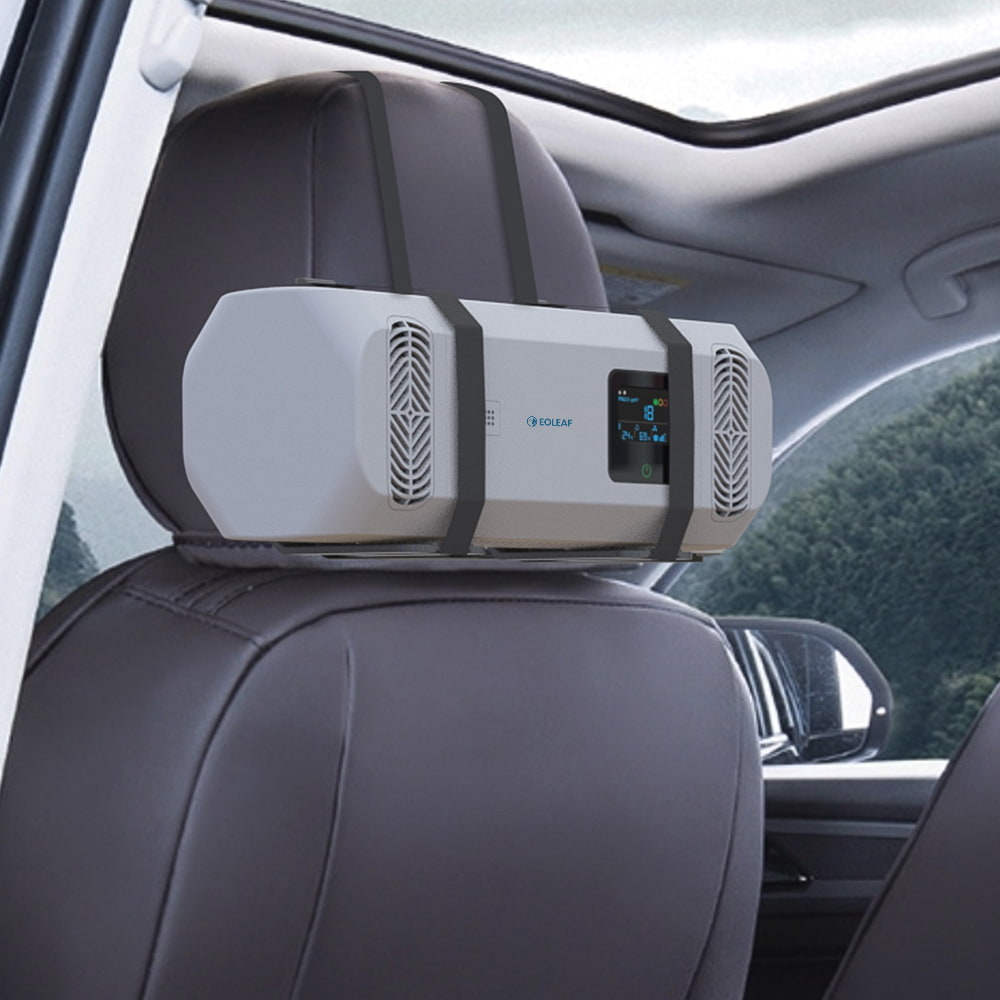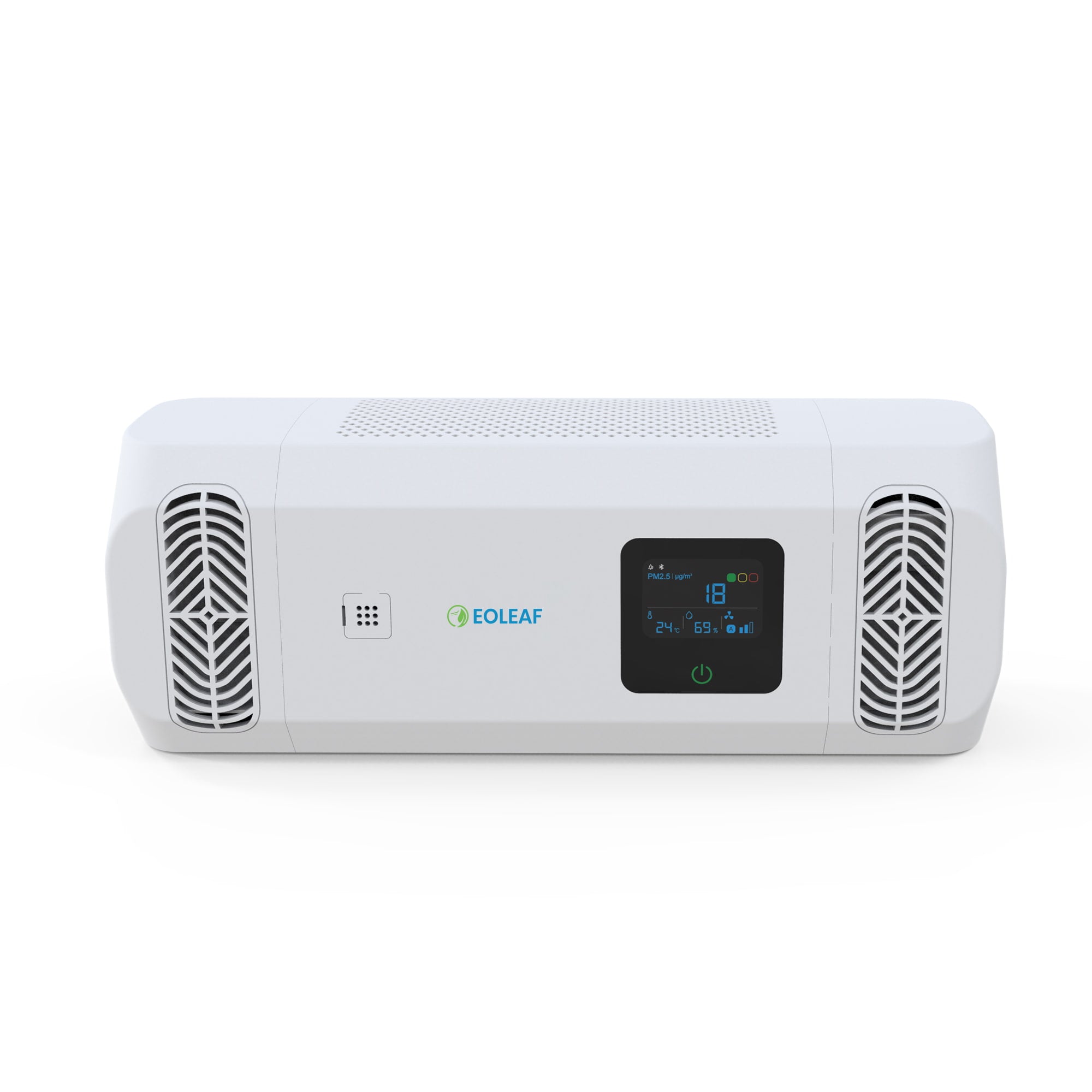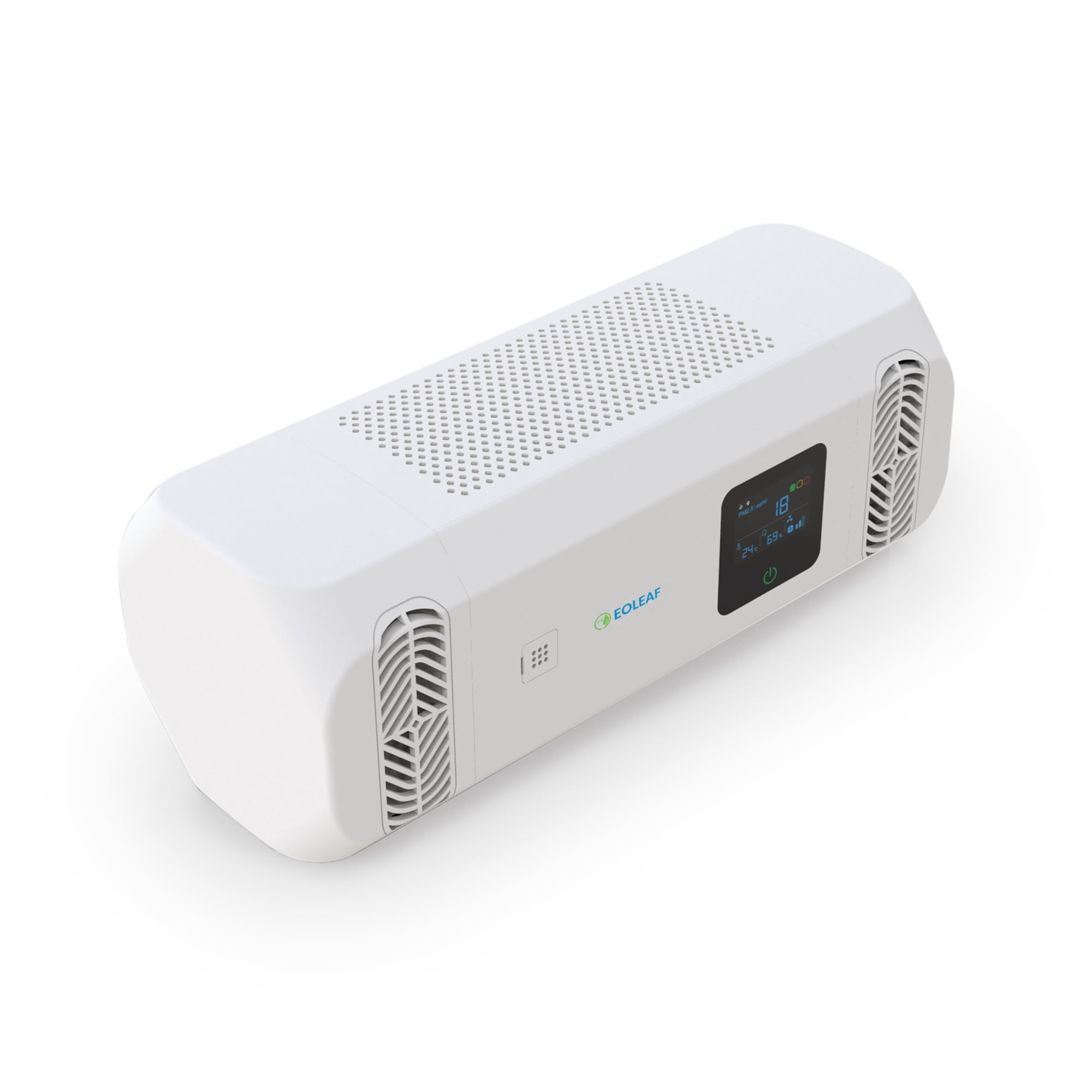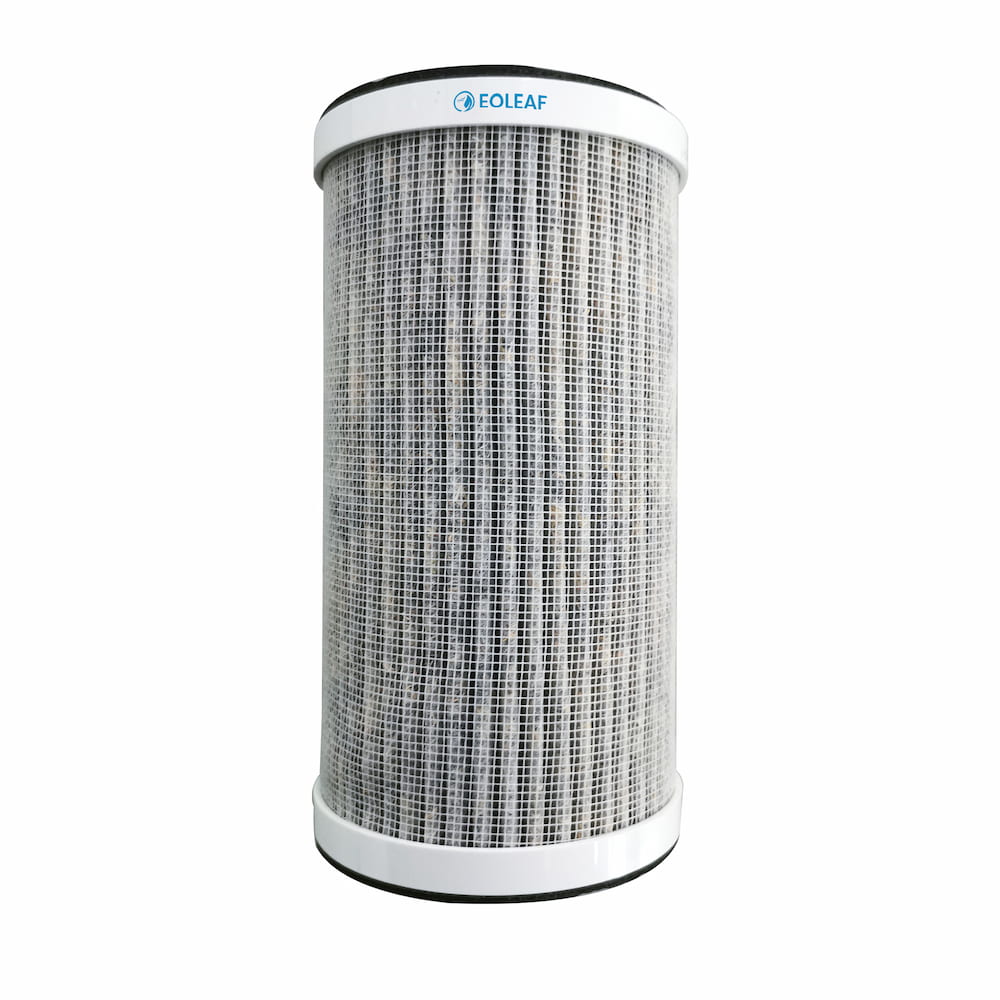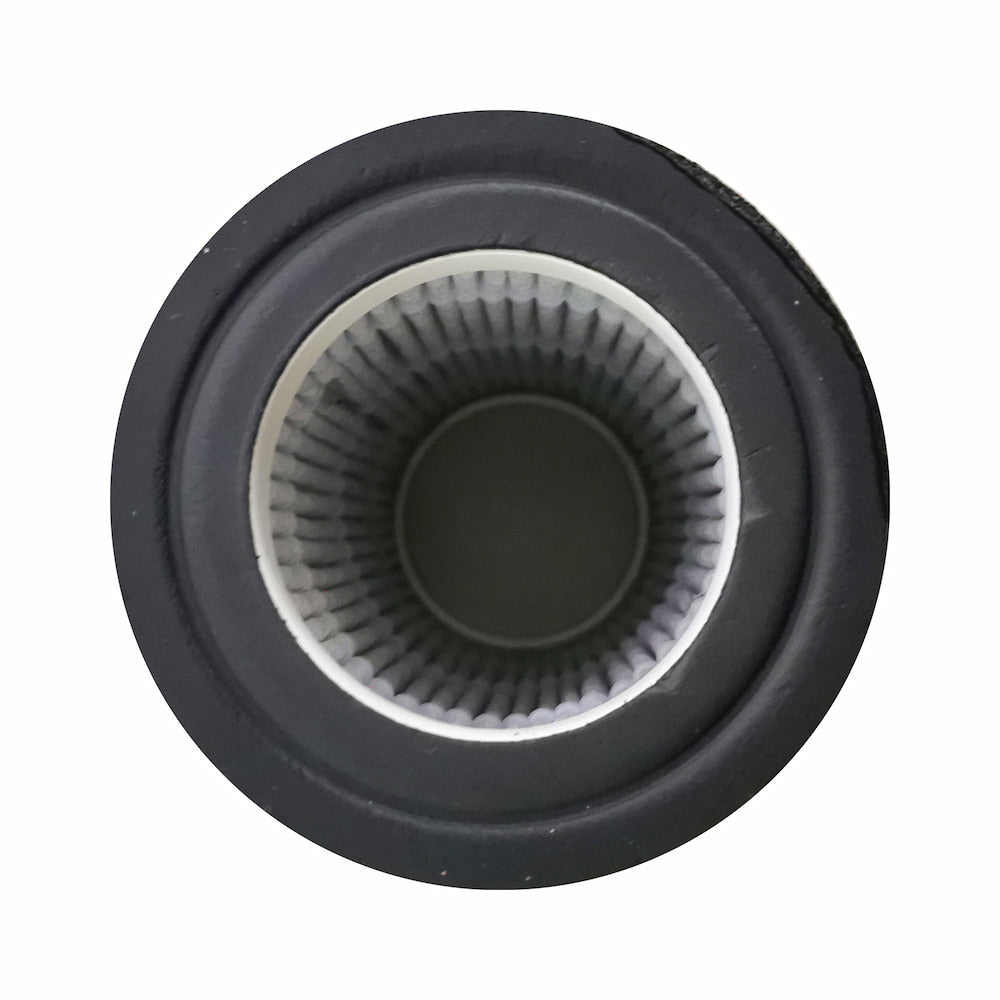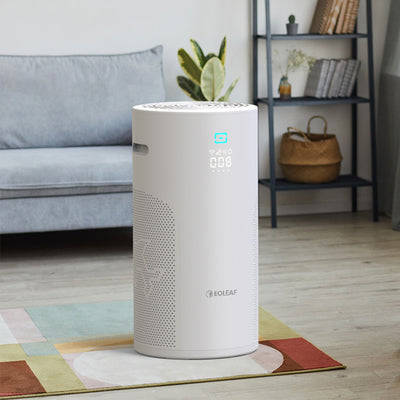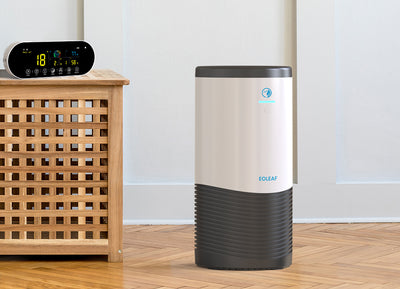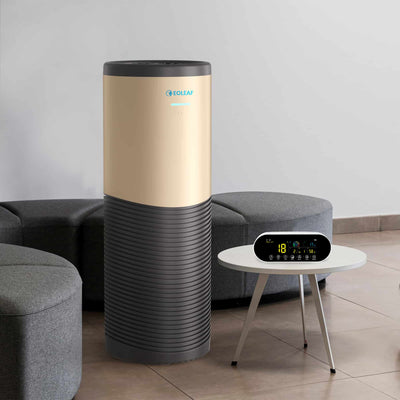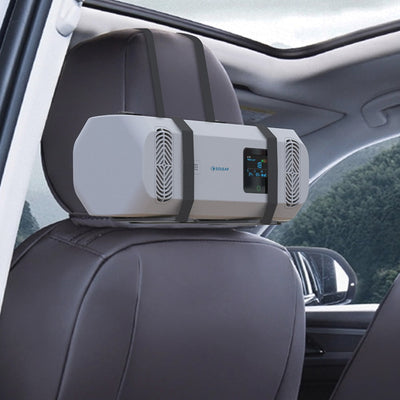Buying an air purifier for your car
On average, commuters spend 5.5% of their lives in their cars1. During this time, we inhale a myriad of pollutants in our vehicle’s cabin, sourced from both outdoor pollution and air pollution directly emitted from our car’s interior. These substances can lead to serious problems for our health. What can we do to protect ourselves? How can a car air purifier help? Read on to find out more.

What are vehicle exhaust emissions?
As we know, vehicles (the transport sector in general) are the largest contributor of greenhouse gas emissions. In the UK alone, they represented 24% of total emissions in 20202. Of course, the amount of emissions emitted by a vehicle depends upon certain factors including the fuel type (older diesel vehicles are the worst offenders), the type of oil used, maintenance of the engine, and the speed and load carried by the vehicle.
What comes out of your car’s exhaust pipe? It is a complex mixture of gases, vapours, aerosols, and other substances. These gases not only contribute to climate change, but they have a significant impact on our health. Some include:
- Carbon dioxide (CO2) – widely accepted as a major contributor of greenhouse gases and ocean acidification when emitted in large quantities
- Carbon monoxide (CO) – a colourless and tasteless gas, also known as ‘the silent killer’, released mostly by older engines with less efficient combustion
- Nitrogen oxides (NOx including NO2) – contribute to smog when they react with other pollutants in the air
- Benzene (C6H6) – found in petrol and diesel; it is carcinogenic to humans
- Sulphur dioxide (SO2) – a colourless gas that is found in crude oil; contributes to smog and engine corrosion
- Ozone (O3) – a contributor to smog that is released when a car accelerates, decelerates, and idles
- Hydrocarbons (HC) – form as a result of incomplete combustion and are released through a vehicle’s exhaust pipe and even through your fuel tank when you fill up
- Fine and ultrafine particles – particulate matter (PM, especially PM2.5) is released upon braking in all vehicles and from the engines of diesel vehicles, especially in the form of black soot and metals; newer vehicles are equipped with diesel particulate filters (DPFs) to reduce the number of particles released into the atmosphere, but these filters cannot prevent particle emissions released whilst braking2,3
Buying an air purifier for your car
-
Discreet and elegant design
-
Quiet yet powerful (up to 45 m3/hr)
-
Easy to use (Automatic mode) and quick to install
-
Compatible with all vehicles: uses a universal strap system
-
Real-time air quality data
-
Filters 99.97% of pollutants using unique and innovative filtration technologies
-
Smartphone app compatibility
The pollutants already present inside your car’s cabin
It is worth mentioning that only 35% of the pollution found inside your car cabin comes from other vehicles. This means that the remaining air pollutants come from inside the vehicle’s cabin. A 2016 study showed that these pollutants consist of toxic substances such as ultrafine particles, volatile organic compounds (VOCs) and semi-volatile organic compounds, aromatic hydrocarbons, carbonyls, dust, and microbes (including mould and spores, fungi, bacteria, viruses, and more)4.
Some of these substances in a car’s cabin, like hydrocarbons and formaldehyde, are emitted directly from materials found inside the vehicle’s interior. They can be found in a vehicle’s carpeting, in the plastic used to build the interior doors, and in fabric and/or leather used to coat the vehicle’s steering wheel. Are you a fan of that “new car smell”? Turns out it’s actually the smell of toxic VOCs! If not ventilated regularly, due to a car’s airtight design, exposure to these substances found in your cabin’s stale air can have a severe impact on human health: they have high allergenic and even cancer-causing effects in addition to other health concerns.
Also, your car’s cabin is the perfect place for germs and microbes to proliferate! Dust can enter through your vehicle’s windows, crumbs from your lunch and leftovers of snacks thrown on the floor by your kids can fall on the floor, and ashes and residue from cigarettes stick to your car’s surfaces. This can attract a host of microbes in your car’s cabin, leading to an accumulation of fungi and mould, further impacting your car cabin’s indoor air quality.

Furthermore, according to the previously mentioned 2016 study, the best recommended measure to depollute a vehicle’s cabin is to recirculate air in the cabin and to install a vehicle air purifier containing one of the best car cabin air filters available4.
The advantages of buying an air purifier for your car
Installing one of the best car air purifiers available in your vehicle can provide a great deal of protection for your health and the health of your loved ones.
Protect your respiratory system during your car journeys
A high-quality car cabin air filter can remove the airborne contaminants found in your vehicle’s cabin. This includes all fine particulate matter from PM10 down to PM0.1, chemical pollution like formaldehyde and VOCs, dangerous hydrocarbons, ozone, build-up of carbon dioxide, and germs (bacteria and viruses like COVID-19). An air purifier can also help remove allergens that may have been tracked into your car such as pet dander, dust, pollen and in-vehicle mould and spores that could be liberated and become airborne whilst driving. Eoleaf’s car air purifiers all come equipped with HEPA-certified filters for vehicles, guaranteeing removal of pollutants measuring down to a size of 0.01 μm. Additionally, Eoleaf’s Pure CAR model serves as a dual purifier/ioniser which can help further combat vehicle chemical pollution and VOCs.
Eliminating all of these air pollutants from your vehicle’s air can help reduce the incidence of allergic rhinitis and other allergy symptoms. Furthermore, a vehicle air purifier can serve as an important ally for sensitive individuals for whom the presence of indoor air pollution in a vehicle can trigger asthma attacks and aggravate other respiratory diseases like COPD.
The best car air filters can also remove bad odours from your vehicle’s cabin. Odours like cigarette smoke, cleaning and maintenance products, petrol, and even those left over from your lunch break may accumulate in your car, creating a less-than-pleasant driving experience. Tobacco can also leave carcinogenic residue in a vehicle (called third-hand smoking) that may last for years and can enter the respiratory system. Removing odours from your car’s cabin can have a positive impact on your daily journeys.
How does an air purifier for your car work?
Car air purifiers are very simple and work the same way an air purifier in your home or office would: contaminated, polluted air from your vehicle's cabin is first pulled into the device using a fan. Once the air has entered the device, it is treated using a variety of filtration technologies. Finally, purified air is recirculated back into your vehicle's cabin.
The different types of cabin air filters and air purifiers for your vehicle
Car air purifiers may come with a variety of technologies. If the goal is to combat fine and ultrafine particles, a HEPA filter is perhaps the most important factor to consider when purchasing your air purifier for your car. These medical-grade filters are capable of trapping toxic gases and both coarse and ultrafine particles alike, from dust and pollen down to 0.01 μm.
Air purifiers that have activated carbon filters are excellent at removing bad odours from inside your vehicle. Not all air purifiers target odours, so if removing odours from your vehicle’s cabin is your aim, be sure to look for activated carbon. Some high-end air purifiers for cars come with additional filtration technologies like pre-filters and ionisation (negative ions).
How to choose an air purifier for your car?
PurCar air purifier
HEPA H13 Filter & Ioniser - For all vehicles
Just like when choosing an air purifier for your home or office, there are multiple things to keep in mind before making your purchase.
Ensure it is compatible
Firstly, make sure that the device is compatible with your vehicle. Does it have a USB plug or does it connect into your car cigarette lighter (also known as an automobile auxiliary power outlet)? Furthermore, some car air purification devices can release positive ions or ozone when they are running, which is bad for your health. Be sure to check that your device produces little to none of both of these to keep your vehicle’s cabin free of pollutants - that’s why you’re purchasing your air purifier in the first place! It also helps to check out car air purifier reviews before purchasing. Car air filter reviews are a great way to make sure that you are purchasing the right device for your needs.
Consider the device's durability and energy consumption
Secondly, consider your future device’s lifespan and energy consumption. A device that consumes less energy will consume less of your car battery’s power, and lower energy consumption is better for the longevity of your air purifier. This allows your car air purifier to continue to purify your vehicle cabin’s air for years to come.
Keep budget in mind
Thirdly, budget is a factor to consider. Initial price of an air purification device varies greatly depending upon its capabilities. High-end air purifiers, like Eoleaf’s, will contain multiple filtration technologies, providing a broad spectrum of action against many types of air pollutants. Additionally, some devices provide more modern amenities like LED indicator lights and control of your device using an app (Eoleaf uses the Tuya Smart app). Keep in mind that maintenance costs will make up a large portion of your budget! Devices with high-quality filters, as found in Eoleaf’s devices, only need changing once every six months; lower-quality filters often need changing multiple times per year.
Consider noise level
Finally, noise level is another important criterion when purchasing your car air purifier. For security reasons, it should never be too loud: you should always be able to hear your engine and other passing vehicles. Furthermore, an air purifier that makes too much noise could disturb you during your journeys.
Eoleaf’s PURE CAR comes equipped with 6 filtration technologies – including all of the technologies mentioned above! – helping you to ensure that your vehicle’s cabin is free of air pollutants and odours. Invest in your health with Eoleaf and start protecting your lungs from inhaling dangerous airborne substances.
For assistance on choosing the right office air purifier, take a look at our Buying Guide here or contact us.

Resources
1 Tolis, E.I., Karanotas, T., Svolakis, G. et al. Air quality in cabin environment of different passenger cars: effect of car usage, fuel type and ventilation/infiltration conditions. Environ Sci Pollut Res 28, 51232–51241 (2021). https://link.springer.com/article/10.1007/s11356-021-14349-9
2 Is my car bad for the environment? A guide to vehicle exhaust emissions. RAC. (2023, May 5). https://www.rac.co.uk/drive/advice/emissions/vehicle-exhaust-emissions-what-comes-out-of-your-cars-exhaust/
3 Haagen-Smit, A J, and Fox, M M. Automobile exhaust and ozone formation. United States Government: N. p., 1972. https://www.osti.gov/biblio/6696462
4 Xu, B., Chen, X., & Xiong, J. (2016). Air Quality Inside Motor Vehicles’ cabins: A Review. Indoor and Built Environment, 27(4), 452–465. https://www.researchgate.net/publication/310466891_Air_quality_inside_motor_vehicles'_cabins_A_review
Eoleaf's Pure CAR and accessories
PurCar air purifier
HEPA H13 Filter & Ioniser - For all vehicles
Eoleaf PurCar replacement filter
(compatible with AIRVIA CAR)

